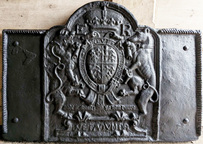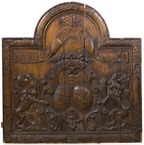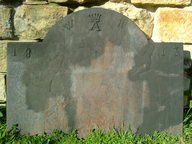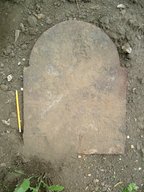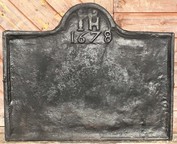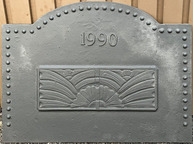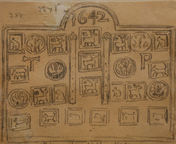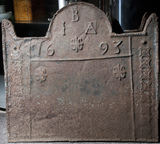-
937
Description: Arched rectangular shape; gadrooned edging (top and sides); initials, in separate stamps, at top of arch; date probably in separate stamps, below, split by spindle; spindle used as a stamp repeated three times, one between date and initial stamps, the other two below to left and right.
Notes: Makes use of the same backing board as other firebacks in this series, and the same three spindles but with other initials; it may originate in the Cuckfield area of Sussex, where most examples have been noted; illustration from Harper (1906). Previously at Riddens (now West Riddens) Farm, Ansty, near Cuckfield, Sussex.
Inscription: S WC / 16 22
- Decoration tags:
- rectangular with round arch (shape)
- gadrooned (edging)
- simple stamps
- individual letters
- individual numbers
- text
- objects
Manufactured: in 1622 possibly at Cuckfield Furnace in the Weald area of England.
Current location: not known.
Citation: Harper, C. G., 1906, The Brighton Road (London, Chapman & Hall), p. 391.
- Attached to series:
- Spindle series
- Spindle/distaff firebacks
-
1288
Description: Arched rectangular shape with rounded corners; ovolo within fillet moulding all round; oval Tudor royal shield with garter surrounding, topped with a royal crown; dragon and greyhound supporters; initials split by crown; inscription on a fillet between legs of supporters, behind garter finial; motto on an Ionic plinth at bottom; two rectangular side panels with twisted rope edging top and side.
Notes: The supporters are those of Henry VII or Henry VIII, but the initials suggest the fireback dates from the reign of Edward VI (1547-53). John Harvo (d. c1565) was a gunfounder who has been identified as occupying Pounsley furnace, Framfield, Sussex, possibly from as early as 1547; the fireback may have been cast originally during the reign of Henry VIII (1509-47), with the initials added to an early casting using the original pattern. The detail on the armorial back is good, showing little wear, so the casting was probably made not long after the original armorial fireback. The rivets are modern.
Inscription: E R / HONY SOIT QVE MAL Y PAYNCE / Made in Sussex by John Harvo / DV ET MOVN DROI
Arms: Tudor royal - Probably Henry VIII
- Decoration tags:
- rectangular with round arch (shape)
- rope (edging)
- simple stamps
- whole carved pattern
- heraldic
- armorial
Manufactured: in the mid- to late-16th century in the Weald area of England.
Current location: not known.
- Attached to series:
- John Harvo series
- Pounsley series
-
1139
Description: Carved wooden fireback pattern. Arched rectangular shape; fillet edging to a rounded frame with sections of acanthus leaves at the corners and at the top of the arch, and blank campartments in between; astragal and fillet inside edging; arched rectangular inscription scroll suspended with faux ribbon from the top of the arch; below, a coronet over a large baroque cartouche containg two oval shields: Massenbach - azure two bars or, d'Helmstadt - argent a crow sable; on either side, lion rampant reguardant supporters; four vertical planklines.
Notes: A finely executed carving. Nicolas de Massenbach (1659-1722) and Francoise d'Helmstadt (d.1729) were married at Ourches-sur-Meuse, in Lorraine, in 1695.
Inscription: NDM 1710 FDH
Arms: Nicolas de Massenbach and Francoise d'Helmstadt
- Decoration tags:
- rectangular with round arch (shape)
- fillet (edging)
- whole carved pattern
- planklines
- heraldic
- armorial
- text
Manufactured: in 1710 in France.
Current location: not known.
Citation: Palasi, P., 2014, Plaques de Cheminées Héraldiques (Paris, Éditions Gourcuff-Gradenigo).
- Attached to series:
- Patterns
-
14
Description: Arched rectangular shape; plain plate. Crowned capital ‘A’ between ‘W’ and ‘R’; divided date at top extremities of plate; single six-pointed star below ‘A’.
Notes: Earl’s coronet denotes the Earl of Ashburnham, furnace owner; ‘WR’ denotes William Rummins, furnace founder; 1813 - the furnace was blown out for the last time in late February 1813. Similar to, but narrower than the fireback at Church Farm, Penhurst (in private hands), and uses the same cipher and numbers. One of a small series of firebacks cast in the early-19th century for farms on the Ashburnham estate; this example was formerly at Great Sprays Farm, Penhurst.
Inscription: W A R / 18 * 13
- Decoration tags:
- rectangular with round arch (shape)
- none (edging)
- carved stamps
- individual letters
- individual numbers
- heraldic
- text
- objects
Manufactured: in 1813 at Ashburnham Furnace in the Weald area of England.
Current location: in private hands, Ashburnham, East Sussex, England.
- Attached to series:
- Ashburnham late series
-
15
Description: Arched rectangular shape; no edging.
Notes: The plain form suggests a common source with firebacks cast at Ashburnham in 1813. One of a small series of firebacks cast in the early-19th century for farms on the Ashburnham estate.
- Decoration tags:
- rectangular with round arch (shape)
- none (edging)
Manufactured: in the early-19th century probably at Ashburnham Furnace in the Weald area of England.
Current location: in private hands, Ashburnham, East Sussex, England.
- Attached to series:
- Ashburnham late series
- Base boards
-
849
Description: Rectangular with superimposed arch; embattled, cavetto moulded edging, with the top edge of the rectangle interrupted; shield, garter, crown, supporters and motto of the English Royal house of Stuart; rose and thistle plants above lion and unicorn supporters respectively; initials split by crown; date below garter.
Notes: A version dated 1619 is proportioned slightly differently and has smaller rose and thistle plant stamps.
Copies of this fireback are known.
Inscription: I R / 16 21
Arms: English Stuart royal - James I
- Decoration tags:
- rectangular with round arch (shape)
- embattled cavetto (edging)
- whole carved pattern
- armorial
- royal
- text
Manufactured: in 1621 in England.
Current location: in private hands, Ashurst, West Sussex, England.
-
603
Description: Arched rectangular shaped, the arch linked to the rectangle by cavetto curves; cavetto edging ending in two opposed spirals at top; initials below spirals; date below initials; otherwise plain.
Notes: Probably cast from a carved, edged board, with the initials and date added separately. A copy.
Copies of this fireback are known.
Inscription: IH / 1678
- Decoration tags:
- rectangular with round arch (shape)
- cavetto (edging)
- individual letters
- individual numbers
- text
Manufactured: in 1678 in the Weald area of England.
Current location: Banbury, Oxfordshire, England.
- Attached to series:
- Small arch series
-
1270
Description: Arched rectangular shape; plain edge with 49 large beads parallel with top and sides; upper centre, date in bold Arabic numerals; below date, raised rectangular panel with chamfered sides and corners and fillet edging, and a symmetrical sunburst and rainbow design in low relief.
Notes: Modern, quasi-Art Deco design
Inscription: 1990
- Decoration tags:
- rectangular with round arch (shape)
- none (edging)
- whole carved pattern
- individual numbers
- text
- objects
Manufactured: in 1990 in England.
Current location: in private hands Bedford, Bedfordshire, England.
- Attached to series:
- Miscellaneous pattern firebacks
- 1990s Art Deco series
-
966
Description: Arched rectangular shape; ovolo moulded edging; date in arch; below arch two parallel, vertical straps, each with a buckle at the top; initials left and right of centre; roughly symmetrical arrangement of four stamps repeated: rectangular stamp with deer three times down centre, one outside each buckle and one beyond each strap end; circular food mould stamp outside centre of each strap, beyond stag stamp outside buckle and at edge beyond strap end; 'rabbit' stamp at edge beyond food mould stamp outside each buckle and outside each strap end; rectangular stamp with 'dog' outside each initial and six times below strap ends.
Notes: The buckles suggest a connection with the Pelham family; the initials may relate to Sir Thomas Pelham, Bt. (1597-1654) who owned and operated ironworks at Waldron in Sussex. From the drawing the seven 'deer' stamps appear to be the same as those seen on two other examples of this fireback. The food mould stamp (centre left and right) appears to be one seen repeated on at least one other fireback. Drawing of a fireback at Huggetts Farm, Waldron, Sussex, by Edward Hughes, of Heathfield, Sussex; J. Starkie Gardner collection, Victoria & Albert Museum, Archive of Art and Design (AAD/2014/8).
Inscription: 1642 / T P
- Decoration tags:
- rectangular with round arch (shape)
- ovolo (edging)
- carved stamps
- whole carved pattern
- individual letters
- text
- animals
- objects
Manufactured: in the mid-17th century probably at Waldron Furnace in the Weald area of England.
Current location: not known.
Citation: Gardner, J. S., 1898, 'Iron Casting in the Weald', Archaeologia, 56, 1, pp. 133-164.
- Attached to series:
- 1642 Pelham series
- Pelham family firebacks
- Food mould stamp firebacks
-
1142
Description: Arched rectangular shape with quadrant extensions on top corners; twisted rope edging (top and sides); vertical rope line parallel to each side, forming two separate side panels; horizontal rope line joined to vertical lines enclosing the following: inside arch, initials IBA in triad; below initials, double fleur-de-lys stamp between split date; below horizontal line, a double fleur stamp in each top corner of central lower panel; in each side panel, a single bead above a vertical sequence of squared cross stamps repeated eight times.
Notes: The distinctive squared cross and fleur stamps are seen on other firebacks; the initials in triad may relate to a husband and wife. A taller variant of the same fireback is at Northgate House, Warwick (no. 1106). Mendip Auctions, Binegar, Somerset, 7 Sep 2019, lot 374.
Inscription: IBA [triad] / 16 93
- Decoration tags:
- rectangular with round arch (shape)
- rope (edging)
- simple stamps
- carved stamps
- individual letters
- individual numbers
- objects
Manufactured: in 1693 in the Forest of Dean area of England.
Current location: not known.
- Attached to series:
- Newent area group
- Square cross Dean series 2
- Fleur-de-lys firebacks
.jpg)
